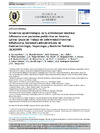Please use this identifier to cite or link to this item:
https://accedacris.ulpgc.es/jspui/handle/10553/76656
| Title: | Tendencia epidemiológica de la enfermedad intestinal inflamatoria en pacientes pediátricos en América Latina: Grupo de Trabajo en Enfermedad Intestinal Inflamatoria, Sociedad Latinoamericana de Gastroenterología, Hepatología y Nutrición Pediátrica (SLAGHNP) | Other Titles: | Epidemiologic trend of pediatric inflammatory bowel disease in Latin America: The Latin American Society for Pediatric Gastroenterology, Hepatology and Nutrition (LASPGHAN) Working Group | Authors: | Larrosa-Haro, A. Abundis-Castro, L. Contreras, M. B. Gallo, M. J. Peña Quintana, Luis Targa Ferreira, C. H. Nacif, P. A. Vázquez-Frías, R. Bravo, S. Muñoz-Urribarri, A. B. Mejía-Castro, M. Orsi, M. Amil-Díaz, J. Busoni, V. Cohen-Sabban, J. Martin-Capri, F. J. Zablah, R. Rodríguez-Guerrero, M. G. Sdepanian, V. L. |
UNESCO Clasification: | 32 Ciencias médicas 3202 Epidemologia 320503 Gastroenterología |
Keywords: | Enfermedad intestinal inflamatoria Colitis ulcerativa Enfermedad de Crohn América Latina Niños y adolescentes, et al |
Issue Date: | 2020 | Journal: | Revista de Gastroenterologia de Mexico | Abstract: | Introducción y objetivos
El objetivo primario fue explorar la tendencia epidemiológica de la enfermedad intestinal inflamatoria pediátrica en América Latina; los secundarios, obtener una visión general del enfoque diagnóstico/terapéutico de miembros de la SLAGHNP y explorar la relación entre la frecuencia de casos y los años del período evaluado.
Material y métodos
Se realizó una encuesta en línea a pediatras gastroenterólogos de América Latina con la plataforma SurveyMonkey. Se preguntó la frecuencia anual de pacientes nuevos de 2005 a 2016, su variedad, los segmentos del tubo digestivo afectados, los métodos de diagnóstico y el tratamiento utilizado. Se evaluó la correlación entre la frecuencia anual y los años de estudio.
Resultados
Se estudió a 607 pacientes; el diagnóstico de colitis ulcerativa se realizó en 475 (78.3%), de enfermedad de Crohn en 104 (17.1%) y de enfermedad intestinal inflamatoria no clasificable en 28 (4.6%). La tendencia de colitis ulcerativa tuvo un incremento lineal con coeficiente de correlación significativo entre la frecuencia de casos nuevos y el año de estudio; 67.6% tuvieron pancolitis. Los métodos de diagnóstico incluyeron datos clínicos, endoscopia y biopsias en más del 99% de los casos; los estudios de imagen se indicaron de manera selectiva. Los esquemas farmacológicos se circunscribieron a derivados del ácido 5-aminosalicílico, azatioprina, 6-mercaptopurina, infliximab y adalimumab.
Conclusiones
La enfermedad intestinal inflamatoria pediátrica en América Latina parece incrementarse en el período estudiado con predominio de formas moderadas o graves de colitis ulcerativa; esta tendencia lineal puede indicar la posibilidad predictiva de incremento gradual en la próxima década, lo que es probable que tenga implicaciones epidemiológicas y clínicas. Introduction and objectives: The primary aim was to explore the epidemiologic trend of pediatric inflammatory bowel disease in Latin America, and the secondary aims were to obtain an overview of the diagnostic/therapeutic focus of the members of the LASPGHAN and examine the relation of case frequency to year, during the study period. Materials and methods: Latin American pediatric gastroenterologists participated in an online survey, conducted through the SurveyMonkey platform, that investigated the yearly frequency of new inflammatory bowel disease patients within the time frame of 2005 to 2016, their disease variety, the gastrointestinal segments affected, and the diagnostic and treatment methods utilized. The correlation of new case frequency with each study year was evaluated. Results: A total of 607 patients were studied. The diagnoses were ulcerative colitis in 475 (78.3%) cases, Crohn's disease in 104 (17.1%), and inflammatory bowel disease D unclassified in 28 (4.6%). The trend in ulcerative colitis was a lineal increase in the frequency of new cases related to each study year, with a significant correlation coefficient. Pancolitis was found in 67.6% of the patients. The diagnostic methods included clinical data, endoscopy, and biopsies in more than 99% of the cases, and imaging studies were indicated selectively. Drug regimens were limited to 5-aminosalicylic acid derivatives, azathioprine, 6-mercaptopurine, infliximab, and adalimumab. Conclusions: Pediatric inflammatory bowel disease in Latin America appears to have increased during the years included in the study period, with a predominance of moderate or severe ulcerative colitis. That lineal trend suggests the predictive likelihood of a gradual increase in the coming years, with possible epidemiologic and clinical implications. |
URI: | https://accedacris.ulpgc.es/handle/10553/76656 | ISSN: | 0375-0906 | DOI: | 10.1016/j.rgmx.2020.07.010 | Source: | Revista de Gastroenterologia de Mexico [ISSN 0375-0906], v. 86(4), p. 328-334 |
| Appears in Collections: | Artículos |
SCOPUSTM
Citations
8
checked on Jun 8, 2025
WEB OF SCIENCETM
Citations
5
checked on Jun 8, 2025
Page view(s)
311
checked on Sep 27, 2025
Download(s)
192
checked on Sep 27, 2025
Google ScholarTM
Check
Altmetric
Share
Export metadata
Items in accedaCRIS are protected by copyright, with all rights reserved, unless otherwise indicated.
